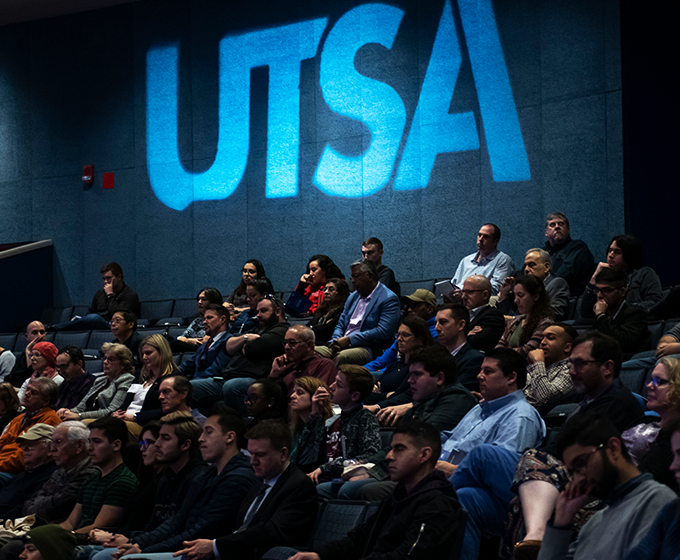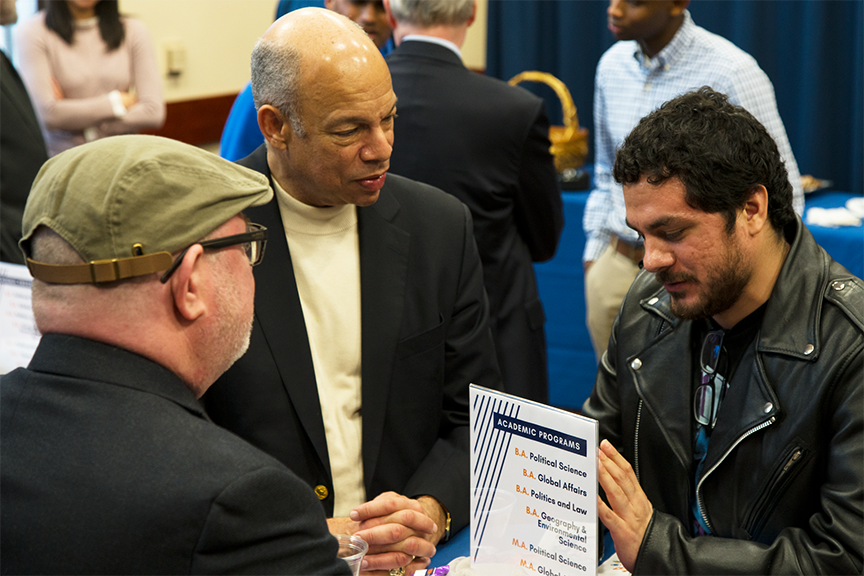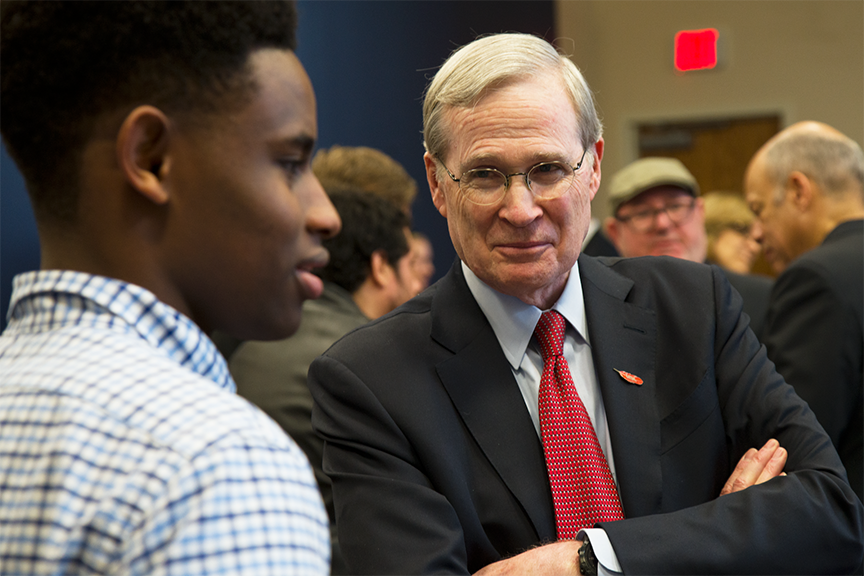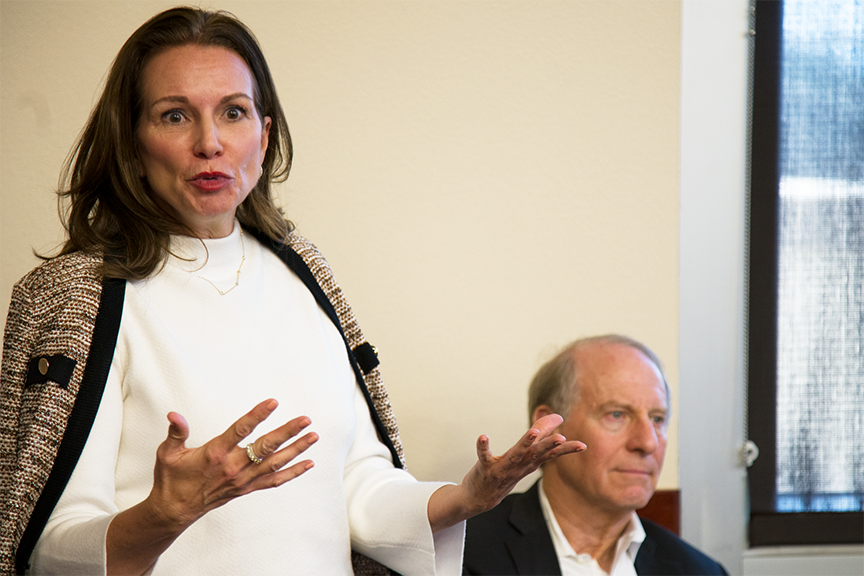
FEBRUARY 14, 2020 — Crowded around a small, round bar table in the Bexar Room of the H-E-B Student Union, former Secretary of Homeland Security Jeh Johnson shared with UTSA students Jacqueline Wheeler, Joshua Stoesz and Steven Whiteside his story of what he was doing on Sept. 11, 2001.
Johnson told the students, “9/11 was my 44th birthday.” From his law offices in New York City he could see the Twin Towers. A colleague told him that a small plane had flown into the first tower. He looked out the window. “That’s not a small plane,” he said he thought to himself. And then the second tower came down—a sight he said he’d never forget. “When the tower collapsed, that’s the one time in my life that my mind literally could not believe what my eyes were seeing.”
That was a pivotal moment for Johnson. He had served over two years in the Pentagon as the general counsel for the department of the Air Force in the Clinton administration. 9/11 propelled him back into public service, first getting involved in then–Sen. Barack Obama’s presidential campaign, then as a senior legal representative for the Department of Defense, before being appointed secretary for the new Homeland Security in the Obama administration.
For Stoesz, that day also changed his life’s trajectory. He enlisted in the U.S. Army just two days later. He served as an infantryman, was later medically discharged and is now a senior majoring in global affairs at UTSA. He’s also concurrently pursuing his graduate studies.
Johnson was on campus with three other distinguished diplomats—Richard Haass, president of the Council on Foreign Relations; Stephen Hadley, deputy national security director and Mary Beth Long, a one-time assistant defense secretary—for the Election 2020: U.S. Foreign Policy Forum, a nonpartisan event hosted at UTSA on Feb. 12 by the Council on Foreign Relations on the 2020 election and foreign relations.
 Former Secretary of Homeland Security Jeh Johnson tells students that 9/11 profoundly affected his move into public service.
Former Secretary of Homeland Security Jeh Johnson tells students that 9/11 profoundly affected his move into public service.
Prior to the sold-out forums the panelists first offered their time in a casual and intimate meet-and-greet with students from the Department of Political Science and Geography. Over fresh cookies and cucumber-infused water about 50 students and faculty in political science and global affairs mingled with the foreign affairs officials, sharing study plans, discussing pressing international policy issues with regard to the upcoming elections and future career plans.
Johnson went on to tell students to be prepared to consider opportunities they may not have anticipated and to get outside their comfort zones. “When I was asked to be secretary of Homeland Security, it was an opportunity that hit me on the side of the head,” he said. “My first question was, ‘Am I qualified for this job?’ And I thought, ‘Well, the president thinks so.’”
Wheeler, a senior political science and cybersecurity student, asked whether there was anything about Johnson’s career he would have changed if he could go back.
“No,” he said. “I tend to believe fate steers us in a particular direction.” For example, he had wanted to attend Harvard Law School “in the worst way,” he shared. “I was rejected.” Instead, he got into Columbia Law School. “In the long run,” he added, “it didn’t make any difference.”
Hadley said he was most influenced to get into national defense work and public service by Walter LeFever, a professor at Cornell University and the book Cold Dawn: The Story of Salt by John Newhouse, “which I thought was fascinating,” he told students and faculty. “I wanted to work on arms control.” He had an opportunity to work as part of Henry Kissinger’s staff and was able to work on just that.
 Council on Foreign Relations President Stephen Hadley tells students he was motivated to get into national defense work by a book.
Council on Foreign Relations President Stephen Hadley tells students he was motivated to get into national defense work by a book.
He told students not to be in a hurry to advance because some jobs can be done only by young people. “Get to know the people you get to know—the people you are working with,” he went on. “The most rewarding thing you can do is do work with people you like and respect on issues that are important to you where you can make a difference.”
Long shared that she was a first-generation college student who was determined to make a difference for her family. With deep Pennsylvania roots she found herself absorbing all she could at Penn State. An opportunity to study in Taiwan led her to learn Chinese. “For a girl whose Girl Scouts troop went to Washington—and that was a big thing—going to Taiwan, I knew I’d never stay in one place again,” she said. “I wanted to see every step of this world.”
After college she took a job in an Arab bank and learned a bit of Arabic. She was already able to communicate in Chinese and some Spanish. She’d been in used car sales and used all those skills to land a job as a covert operative for the CIA, she said. She spent 13 years as part of the directorate of operations.
 Former Deputy National Security Director Mary Beth Long said she was a first-gen college student determined to make a difference.
Former Deputy National Security Director Mary Beth Long said she was a first-gen college student determined to make a difference.
Long’s advice for students: “Be the hardest working person in the room. Get the job done and don’t forget to give back to your community.” Government service is the most undersold in the world, she said. In the intelligence field you will do it all on your own. “Don’t work for people you don’t like or respect,” she said. “It won’t be worth it.”
Haass told students that as young people working in foreign relations, they would get opportunities they’d never get in other places. “Don’t overplan,” he said. “If you constantly do the things that are most interesting, that stretch you the most, you will succeed.”
Whiteside, a military veteran and a graduate student in global affairs at UTSA, said what the foreign officials had to say, and their advice, was impressive.
Political science and geography department chair Jon Taylor said it was a rare opportunity for students to meet foreign dignitaries that had such significant roles on the national stage. “They were willing to stand around and chat with our students about foreign policy, how it related to their majors and to ask students, ‘What is the most pressing foreign policy for the U.S.?’”
Taylor said the meet-and-greet and the forum could lead to future partnerships and opportunities for students and in the coming weeks, and some classes will hold video conferences with the Council on Foreign Relations. “It was a great way to put UTSA out there,” he said. “It was fun for the students and fun for the panelists.”
Connect with UTSA online at Facebook, Twitter, YouTube, Instagram and LinkedIn.
UTSA Today is produced by University Communications and Marketing, the official news source of The University of Texas at San Antonio. Send your feedback to news@utsa.edu. Keep up-to-date on UTSA news by visiting UTSA Today. Connect with UTSA online at Facebook, Twitter, Youtube and Instagram.
Move In To COLFA is strongly recommended for new students in COLFA. It gives you the chance to learn about the Student Success Center, campus resources and meet new friends!
Academic Classroom: Lecture Hall (MH 2.01.10,) McKinney Humanities BldgWe invite you to join us for Birds Up! Downtown, an exciting welcome back event designed to connect students with the different departments at the Downtown Campus. Students will have the opportunity to learn about some of the departments on campus, gain access to different resources, and collect some giveaways!
Bill Miller PlazaCome and celebrate this year's homecoming at the Downtown Campus with food, games, giveaways, music, and more. We look forward to seeing your Roadrunner Spirit!
Bill Miller PlazaThe University of Texas at San Antonio is dedicated to the advancement of knowledge through research and discovery, teaching and learning, community engagement and public service. As an institution of access and excellence, UTSA embraces multicultural traditions and serves as a center for intellectual and creative resources as well as a catalyst for socioeconomic development and the commercialization of intellectual property - for Texas, the nation and the world.
To be a premier public research university, providing access to educational excellence and preparing citizen leaders for the global environment.
We encourage an environment of dialogue and discovery, where integrity, excellence, respect, collaboration and innovation are fostered.